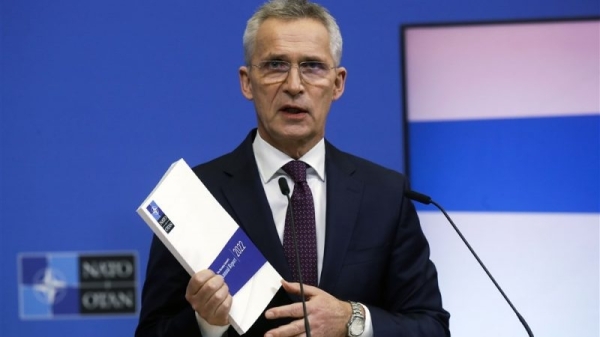Majority of NATO members still short of alliance’s spending pledge

While NATO members have ramped up their defence spending, only seven out of 30 allies actually met the alliance’s military spending target in 2022, according to the latest report published on Tuesday (21 March).
“We are moving in the right direction but not as fast as the dangerous world we live in demands,” NATO Secretary-General Jens Stoltenberg told reporters in Brussels while presenting the annual NATO report.
According to the document, most NATO allies are not reaching the target – to spend 2% of their GDP on defence – as they had agreed to do at the Wales summit in 2014.
Seven out of 30 allies met the military spending target in 2022, the report said. This is one country less than in 2021, before Russia’s invasion of Ukraine.
The seven include Estonia (2.12%), Greece (3,54%), Latvia (2.07%), Lithuania (2.47%), Poland (2.42%), the United Kingdom (2.16%), and the United States (3.46%).
In stark contrast, Europe’s largest economies – Germany (1.49%), Italy (1.51%), and France (1.89%) – fall notably short of the 2% target.
The military alliance had originally expected two more countries to meet the goal this year, Stoltenberg added, without saying which.
“But because GDP has increased more than expected for a couple of allies, two allies that we expected to be at 2% are now slightly below 2%,” he explained.
The defence spending analysis comes as the Western military alliance is expected to agree on a new defence spending pledge at its next summit in Vilnius in July.
“In July, I expect allies to agree to a more ambitious defence investment pledge, as 2% of GDP is a minimum to be invested in our defence”, Stoltenberg told reporters.
Overall, NATO allies spent 2.58% of their total GDP on defence.
“European allies and Canada have increased defence spending for the eighth consecutive year,” the report said.
“In total, over the last eight years, this increase added $350 billion for defence,” it added in reference to 2014, the year of the Russian annexation of Crimea.
“I welcome the progress, but it’s obvious we need to do more and faster”, Stoltenberg said.
“Many allies have announced significant defence spending increases since the invasion. Now it has to turn into real cash, contracts, and equipment.”
“A fully-fledged invasion [of Ukraine by Russia] last February has made [the world] more difficult and dangerous, so if there was a need to increase defence spending back in 2014, this is even more obvious [now]”, Stoltenberg said.



